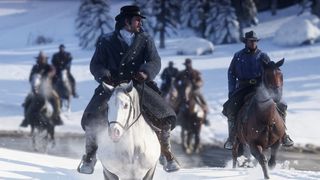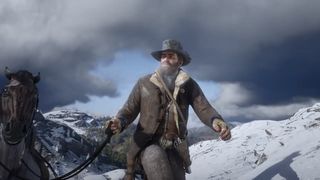Video Gamer is reader-supported. When you buy through links on our site, we may earn an affiliate commission. Prices subject to change. Learn more
And so, like a diamond, arrives Red Dead Redemption 2. Not just for its rarity (arriving eight years after the original, and five since the last Rockstar game) or its gleam, but for the conflict of its conception. Sure enough, within minutes of the game’s opening, you can see the timesheets of QA testers stapled to every square inch of the screen – so smooth its movement, so assured the grit of its world. And yet to start the game is to submit to the whims of a developer both wholly aware of your presence and utterly determined to forget it.
I felt, in those first few hours, as if I had succumbed to Stockholm Syndrome. Embroidered with self-awareness, the joys of its first act are an acquired taste. Like a dusty border town, it isn’t a starting point but a place of pilgrimage. You arrive here after the roaring boat chase of Uncharted 4, the winnowed awakening of Breath of the Wild, and the swinging of Kratos’ axe, in God of War, which hacked to the heart of the matter in seconds. And like the folks in Dutch’s gang, bound together by a blizzard, you huddle, you wait, you listen. And, Rockstar demands, you like it.
And I do. But I’m convinced Rockstar’s house style is not only one of cinematic ambition but of stubbornness. You want bombast? F*** you. Gameplay comes first? F*** you. Games can’t be films? F*** you. The Houser brothers, gaming’s enfants terrible, have always made games with the quiddity of Quentin Tarantino, as if his spirit is split into two souls. It’s Dan Houser that’s written Red Dead Redemption 2 (along with Michael Unsworth and Rupert Humphries), and it’s The Hateful Eight that colours its first frames.
Tarantino’s snowbound western sees lines of paranoid dialogue driven into the narrative track like railroad spikes, hurtling toward the ensured explosion of violence. With Red Dead Redemption 2, it isn’t violence alone that’s promised but the labour-lacquered treasure of its open world. Rockstar behaves as if brilliance is assured, and its confidence ferments into a form of self-awareness. You can sense, if not see, the size of the thing in those early scenes as well, pushing against a wall of cloud up in the mountains. But in the meantime there are conversations and camera angles more requiring of your attention.
The reason I’m happy to be held hostage, I suppose, comes down to control, and who has it. The gigantism of the gaming landscape – the chainsaw bayonets, the nitrous-injected batmobiles, and the underwater cities – offers much in the way of spectacle. But it often has the curious effect of pulling our eyes toward the twinkle of the everyday. Rockstar understands this fetishisation intimately. Its gifts to you, at the start of Red Dead Redemption 2, are in cupboards and drawers (which I instinctively feel must be closed); they’re in tins marked ‘salted meat’; and in the way Arthur pulls a chair out, just so, before slumping into it; or clamps a cigarette between his teeth.
These are Rockstar’s rewards to you: if it prizes creative control over all else, it wants you to have creative control over everything not pinned between the black bars of its cutscenes. And why don’t you want that? Don’t you think you should want that? What’s wrong with you? Rockstar is like a cat, not understanding why you don’t appreciate the bird it bears in its mouth. I can understand the frustrations of players who complain at the glacial pace, and emerge from the radial menus with their fingers in knots, but I’ve hopelessly fallen for my captors.
The Byzantine controls have made me near-neurotic, like a bird needlessly pecking its feathers. I think, for instance, while searching a barn early on, Arthur – my Arthur – would hold his rifle by the barrel down to his side. He wouldn’t holster it, not yet, because he senses that something might be afoot. What function this has, this tapping of L1 to let my rifle droop, I’ve no idea; it strikes me as a tool for pure role-playing. Perhaps your Arthur will be the brash sort that doesn’t get off his horse and opt to lead it, by hand, to the hitching post – in which case you’re clearly a savage, uncultured in equine niceties.
Or else, you value your time. That’s fair, but I can tell you that by the time the hoofbeats of the opening canter had hastened into a gallop, I felt a strange sensation. The world was surging into view, the possibilities blossoming before me, and yet, I felt compelled to hold my horses. I longed for the languor of captivity.



